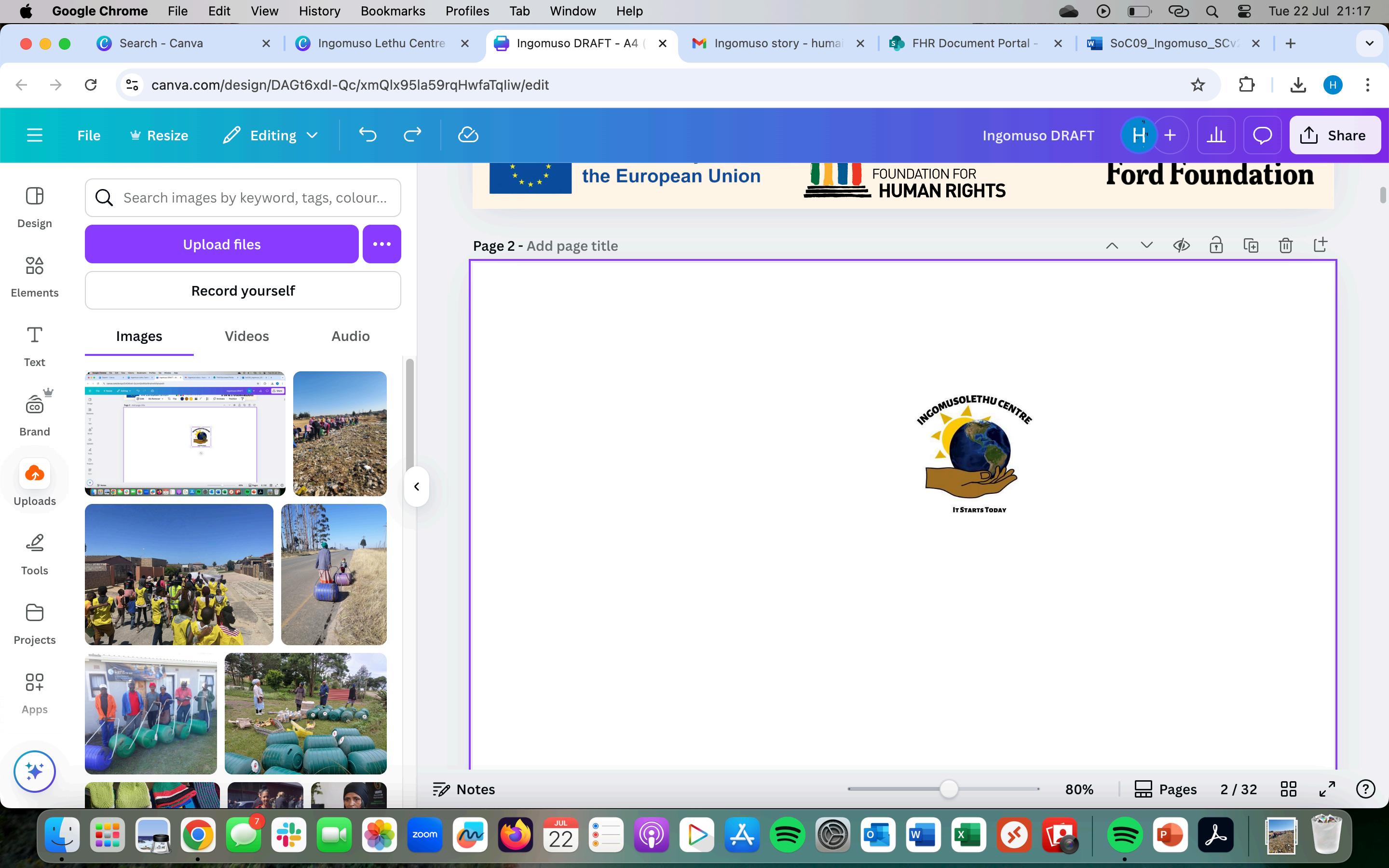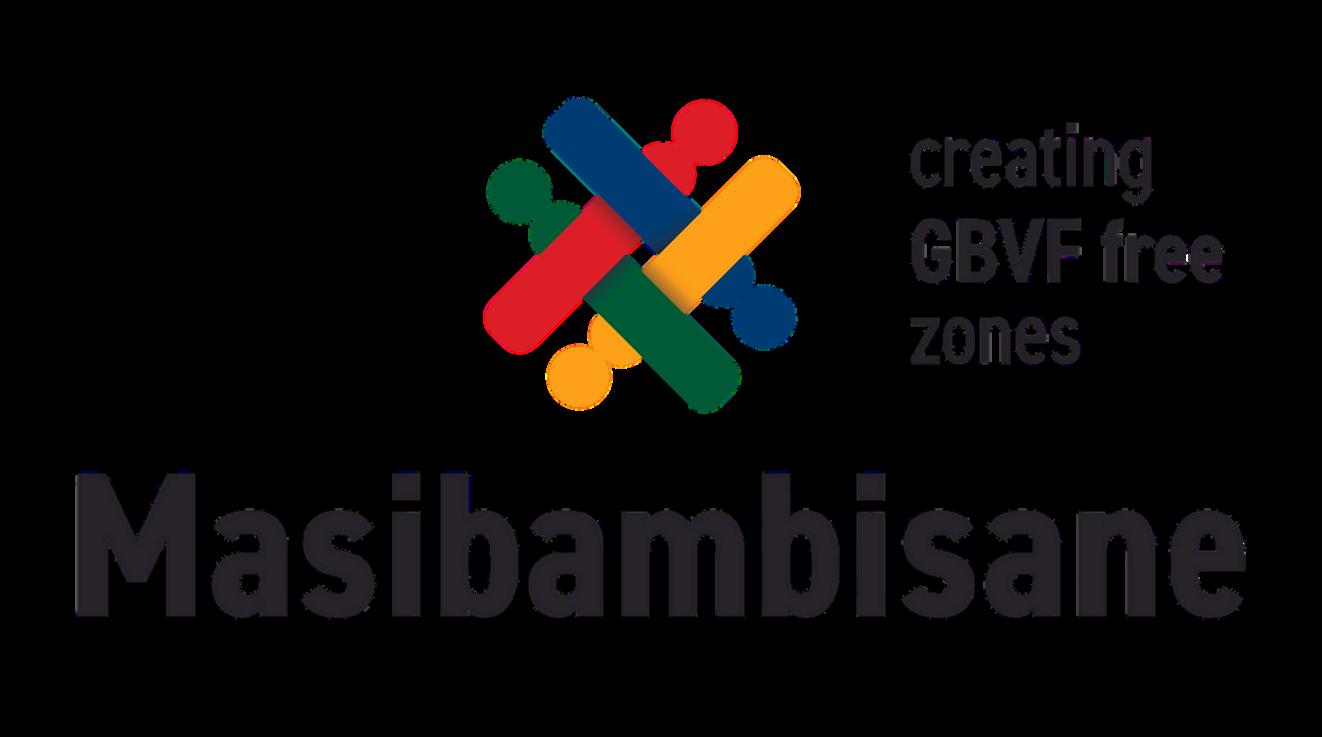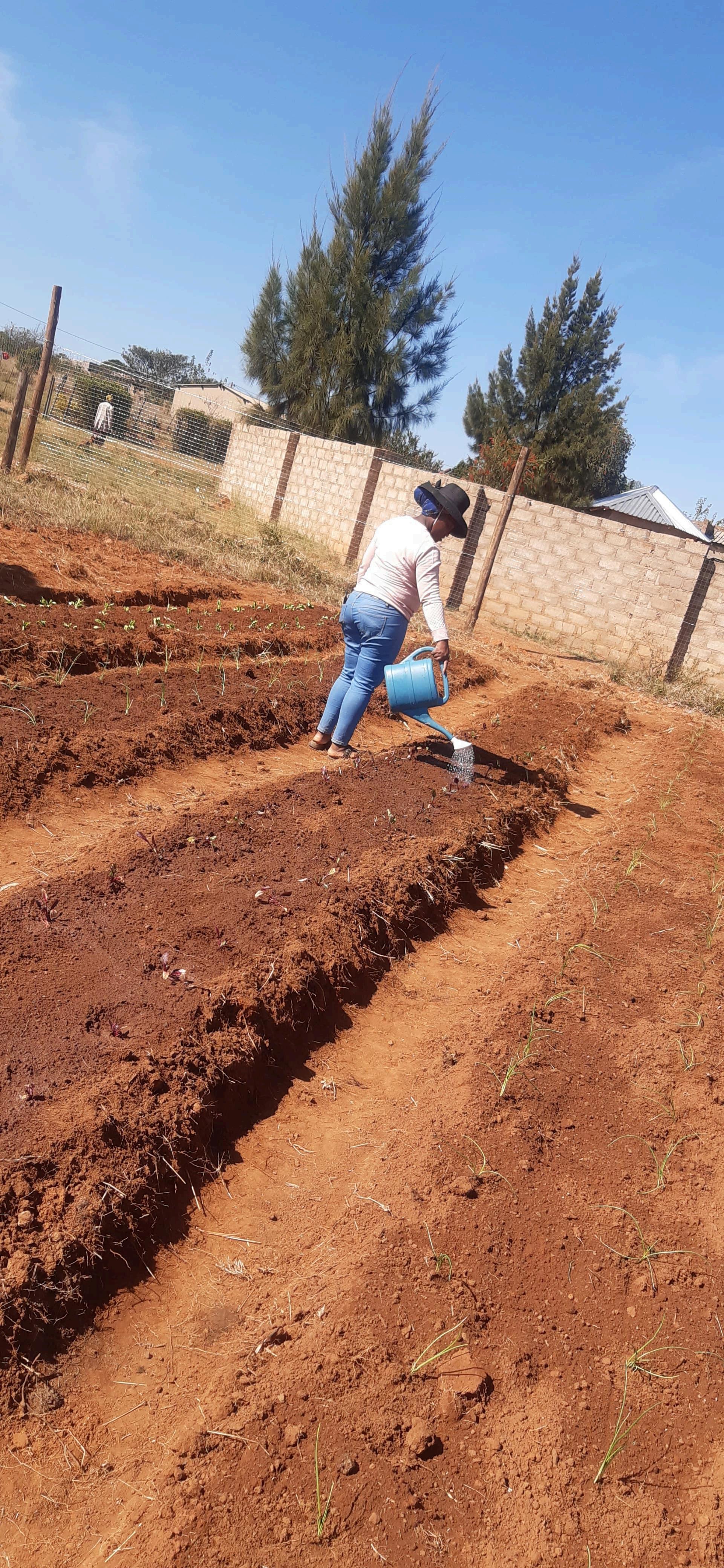‘Itallstartswith confidentiality, listeningand buildingtrust.’

Masibambisane:CreatingGBVF-FreeZones



‘Itallstartswith confidentiality, listeningand buildingtrust.’

Masibambisane:CreatingGBVF-FreeZones



The Ingomuso Lethu Centre (ILC) is based in 1580 Verena D, Mpumalanga. Before we became Ingomuso Lethu, our journey began with a shared commitment among community members to respond to the growing crisis of genderbased violence and femicide (GBVF). Long before we had an office or formal structure, some of us were already volunteering,atorphanages,helpingfamiliesincrisis,assistingwithgrantapplicationsorofferinginformallegaladvice. What brought us together was a deep-seated drive to uplift the community and stand by those most affected by violenceandpoverty.
In 2017, this informal support network became the Ingomuso Lethu Centre, a self-help initiative that grew into a registerednon-profitorganisationbasedinVerenaD.WeformedtheCentrenotoutoftheoryorstrategy,butfromthe realityontheground:womenbeingsilencedbyfearordependency,familiesstrugglingwithoutaccesstoservicesand survivorsofabuselefttonavigatesystemsalone.
Today,ourworkfocusesonwhatwecontinuetowitnessfirsthand,gender-basedviolence,economichardshipandthe lack of accessible legal and psychosocial support. That’s why our programmes include free paralegal services, school awarenesscampaigns,door-to-dooroutreachandmen’sdialoguestoaddresssubstanceabuseanddomesticconflict. OurteamofGBVFmonitorsispresentinclinics,policestations,homes,schoolsandcommunityoffices.Thatvisibilityhas helpedbuildtrust,makingiteasierforsurvivorstospeakoutandseekhelp.
We’veseentheimpactofthiswork.Morethan200homevisitshavebeenmadetosurvivors,manyofwhomhadnever spoken to anyone before. A local GBVF awareness campaign brought over 75 women into conversation through the church.We’veworkedwithtraditionalauthoritiesandschoolstocreatesaferspacesforchildren,andwe’vehelpedmen access addiction support through our partnership with the South African National Council on Alcohol and Drug Dependence(SANCA).
WehavealsopartneredwithLegalAidofSouthAfrica;itcomestoourofficestwiceamonthonTuesdays.Theyattendto cases we’ve collected that need legal attention. This has been a great initiative to our organisation as it helps solve issuesforfree,asatfirstwehadtoreferclientstoWitbankLegalAidofficesaresituated.
This is not just a programme – it’s a community-based response rooted in care, built on trust and driven by the belief thatnooneshouldfaceviolencealone.

Day Location MainActivities
Monday Localclinic Privateconsultations:intakeandrecordingofnewcases
Tuesday SASSA*pay-point Pop-upworkshopswithawarenesstalks,caserecording
Wednesday Policestation(9:00–15:00) Walk-insupport,courtaccompanimentforvictims
Thusday Door-to-dooroutreach Homevisits,follow-upsandinformalcounselling
Friday Flexiblefieldwork Courtorstakeholdervisits,asneeded
Saturday Tribalcourtoninvitation Mediationsupport,paralegaladvice
CurrentILCadditionalprojectsinclude:
TheHelpDeskattheILCoffice(freeservices,referralstoSAPS&DSD). Schoolawarenesscampaigns(learnercounsellingandreferrals).
Men’sdialogues–KhulumaNdoda–inpartnershipwithSANCAtoaddresssubstance-useandGBV.





Lucia: Before we started working on GBV, our office used to offer paralegal services to our community. We were advocating for, promoting and protecting humanrights.
Zanele: What made us get involved in GBVF monitoringwasthatthereweremanycases,andwe could not make proper follow-ups. We realised that if we joined the Ingomuso Lethu programme and worked together, we’d be able to track our cases andmonitortheiroutcomesmoreeffectively.
Lindiwe: We noticed that there were many cases being reported to our network. We had limited knowledge on how to handle them. People would come seeking advice and help. We then realised that this was an important issue troubling our community. We decided it was best to get involved with GBVF monitoring so that we could receive the necessaryGBVF-relatedinformationandtrainings.It becameeasierwhenwejoinedtheprogramme.We got the training and began working with the stakeholders. What really motivated us were the challengesthecommunitybroughttous.

Lucia: As she has explained, that’s why we added GBV to our work at Ingomuso Lethu. We noticed that the government doesn’t follow up with victims. For instance, after a victim opens a case at the police, followed by a court appearance, especially if the perpetratorisarrestedandsentenced,whathappens to the victim afterwards? When the victim attends court, they don’t receive any support, legal advice or psychological guidance from social workers. So we decided that Ingomuso Lethu should implement this GBVFinitiativetoclosetheseloopholesforsurvivors.
Lindiwe: On Wednesdays, we report on duty at 9am and off at 3pm. We wait for victims, or if someone needssupportfortheircourtappearance,wegowith them. On Mondays, we’re based at the clinic. We liaise with clinic officials, and they provide us with an office where we can operate in privacy. This gives GBV victims a safe place to speak and we can also recordtheircases.
Tuesdays depend on how things are at SASSA [the South African Social Security Agency]. We target pay days because that’s when a lot of people go there. We do workshops and record cases. Thursdays are for door-to-door visits. Fridays vary, sometimes we go out, sometimes not. Saturdays, if the tribal authorities invite us, we attend cases there. That’s howwecarryoutourGBVFmonitoring.


Lucia:WhatIcansayis,GBVisarealityinVerena,beforewestartedgoingfortrainingsorimplementingprogrammes,I didn’tfullyunderstanditmyself.
“IusedtothinkthatGBVonlymeantphysicalorsexualviolence. Iwasn’tawareitalsoincludesfinancialandpsychological
abuse.Oncethatwasexplainedtous,Irealisedthatthereare manytypesofGBV.”
Lucia:WhatIcansayis,GBVisarealityinVerena,beforewestartedgoingfortrainingsorimplementingprogrammes,I didn’tfullyunderstanditmyself.
Andthat’stheproblem.MostpeoplehereinVerenadoexperienceGBV,buttheydon’thavetheknowledgetorecognise itorevenreportitproperly.
RIMatlala:Therearemanytypesofcases.Someareassaultsandsomeinvolvewomenabusingmenfinancially.These days,it’shardtosaywhichonesaremorecommon.Insomefamilies,womenarethebreadwinnersandthatstillcarries astigmaformanypeople.
“There’sstillalotofworktodotoeducatepeopleonwhat domesticviolenceis.”
Somemenstillbelievethattheycan’treporttheirwivestothepolice.Evenwhensomearephysicallyabused.Whenyou askthemwhathappened,they’llsay,‘Ifell’,whentheydidn’t.They’rejustashamedtoadmitthey’rebeingabused.They believethepolicewilllaughatthem.Butit’snotlikethat.Somanycasesgounreported.

MostofthecasesIdealwithareassault-related,especiallybetweengirlfriendsandboyfriends.Notsomuchwitholder people. And with some of these youngsters, when you refer them to someone their own age for help, they think that person won’t be able to help because they doubt their professionalism. That’s just wrong. So, there’s still a lot of work neededtoraiseawareness.
Lindiwe:Recently,we’vebeenseeingmoreGBVcases inschools.Whenwevisit,wecomeacrosssomeofthe most difficult cases, with children as young as six being assaulted at home. It becomes difficult because you now need to do home visits. And when yougetthere,it’shardtogettothetruth.It’softenthe child’sword,andyouhavetoverifyitwiththeparent.
Some parents are negligent, they notice changes in their child’s behaviour but they don’t look at the root causes. This is what makes our work in schools difficult.
We’ve noticed GBV happening both through bullying at school and in children’s homes. Statistically, it’s womenwhoaremoreopen.
Lucia:We’restillhandlingsomeGBVcasesinschools, andsomelearnersarenowreceivingcounselling.

“IthinktheDepartmentofEducationmusttrainteachers. Sometimesachildopensuptoateacher,ortheteachernotices changesinthechild’sbehaviour,butthere’snofollow-up.The
teacherdoesn’twriteareferralrecommendingthechild receivescounselling.”
Often,thetraumaisstoredinthechild’smind.Andsometeachersevenkeepthatinformationtothemselves,especially whentheperpetratorissomeonefromthehighschooloraknownelderinthecommunity.
We first started encountering these cases last year, when we began school awareness campaigns. Some teachers did refercasestous,andwethentookthemtotheDepartmentofSocialDevelopment[DSD].Wefollowupandaccompany thekidstotheircounsellingsessionsforsupport.
That’swhyIsaidthatteachersneedpropertraining.Thesecasesarereal.Sexualharassmentishappening.

RI Matlala: Socio-economic factors play a big role. You know what they say: an idle mind makes up all sorts of silly things. For instance, when there’s unemployment, no money and people rely on grant money, you find them counting thepiecesofmeatthatgointothepot.
Martha:Let me start by staying that abuse between men and women often starts off with small everyday things. Over time,itescalatesandgetsoutofcontrol.Bythetimepeopleareolder,it’shardtotracetherootcausebecauseitstarted withsomethingsmallandkeptgrowing.Atthatpoint,youcan’treallysaywhatstartedit,butit’sthere.

RIMatlala: If these issues aren’t addressed early on, as the previous speaker said, they can grow to the point where something like slapping women becomes normal. When problems are left unattended, they often become the main causeofabuse.
With young people, it’s often about dating issues, jealousy, things like, ‘My ex can’t be dating so-and-so!’ Most of the caseswehandlearefromyoungsters.Olderpeopleusually gotothetribalcourt.
At the police station, it’s mostly young kids. You might even be 18 years older than them. They think that tribal court meansdealingwiththeelders.Butactually,tribalcourtsare no longer dominated by elders like before. These days, it’s not old people sitting there ‘eating bones’, as they used to say. It’s people in offices who are handling these issues nowadays.
Some still expect the old setup and get a bit of a culture shock, a reality check. When they get there and are asked, ‘Areyouhereaboutyourhusband?’,theyarereferredtothe right person to deal with their cases. But some don’t speak up.Theygothereandleavewithoutspeaking.
Women tend to speak up. Men? I know this man here won’t speak!That’swhyIsaythatmanypeoplestillbelievethatif they report something at the police station, they’ll be laughedat.Butthat’snottrue.

RIMatlala:OneofthechallengeswefaceisthatmostGBVvictimsopencasesandthendropthem.Thishappensalot in situations where drinking alcohol was involved, or where people make promises to each other about money. You’ll hearsomeonetalkaboutapoliceofficer–remember,hewasn’taconstableatthedrinkingspot.They’llreportthatthis officer beat a woman and she opened a case. But because he’s worried about his reputation, he’ll pay the woman R5,000todropthecase.
Inmostofthesesituations,we’realreadyinvolvedandsupportingthevictim.Butwhenthevictimisofferedmoney,they often don’t come back to tell us they’ve dropped the case. We only realise what’s happened when we call them for a follow-up.Wesuddenlycan’treachthem,ortheyavoidusbecausetheydon’twanttoproceed.
Anotherbigchallengeisthatwedon’thaveformaltraininganddon’tknowwhattodoincertainsituations.Sometimes youfindyourselfincourtandtheyaskthevictim,‘Whyaren’tyouspeakingtotheperpetrator?Aren’ttheyyourfriendor relative? Why not just forgive each other?’ That puts victims in a difficult position. They feel the system is failing them becausetheyareaskedtoforgivepeopletheyoncetrusted,includingthecourt.
Thesearesomeofthechallengeswedealwitheveryday.
Lucia:Wehadonecasewhereweaccompaniedthevictimtocourttoofferphysicalsupport.Thevictimwasbeatenby a friend last year, who was arrested but is now out on bail. Yesterday, the victim was attending court and was asked if they had talked it over with the abuser and forgiven each other. When we asked who’d called, she said it was the perpetrator’slawyerfromlegalaid.Thelawyerspoketothevictimandaskedthemtodropcharges.
She feels like the justice system is failing her. Victims report casesbutarethenaskedtodropthecharges.
Doyouseehowmuchwestillneedtrainingonhowtodealwith suchcasesandgetequippedwithwaystohelpvictims,andto understandbetterhowcourtprocesseswork.
RI Matlala: May I add that it’s not that justice has failed the victims. It’s their lack of knowledge. Lawyers are hired to help deal with whatever problems you have. But the person who called her, from what I hear, wasn’t from the court. He was the perpetrator’s lawyer, and of course he’ll try to get the perpetratoroutoftrouble.He’stheretodefendhim,right?
Thevictimdidn’trealisethat.Asyousaid,whenyouknowabout this, you tell them not to listen because they’re defending the perpetrator. But we can’t blame the victims. If you as the GBV monitor were more knowledgeable, you’d be able to guide them properly with your support. The victim just saw someone in a gown and thought they were with the court. They just assume they were dealing with a court official. Yes, he is, but not the actual official representing the prosecution, the Department of Justice. No, he’s actually defending the perpetrator.
That’swhy,whenyou’reawitness,thedefencelawyerwilltryto question you in a way that makes you angry. They want to makeyoufumble.Thecourtitselfcannotdothat.Theyjustlook atthemeritsofthecase.Theycan’ttakeeverycase.

Somecasescanbesolvedbycallingpeopletogethertospeak.That’swhysomemattersaredealtwithoutsidecourt.
For example, someone wants to get a protection order but the court thinks the matter can be resolved by speaking. However, they do consider the merits and feasibility of the case. Some cases are not treated as criminal cases where youappearincourtinfrontofpeople.Themagistrateandprosecutormaycallyouasidebeforethecasebeginssoyou canspeakandperhapsreacharesolution.
Martha: So, a date would be set for an appearance before the tribal court. But some people then don’t come to their tribal court appearances. You call them and they don’t pick up. When you send people to check if they’re at home, they’renowheretobefound.HowdoIproceedinsuchinstances,whenapersonisalsounreachableonacall?
RIMatlala:Peopleoftensay,‘Wespokeaboutitathome’.Otherpeoplemightbeworriedaboutwhatthechildrenwilleat sincetheabuseristheonlybreadwinner.Otherswillreportasituationoutofanger.
Youexplainandtrytoconvincethemthattheyshouldproceedwiththecase.Butevenwhentheydo,they’lloftentellthe courtthattheydon’twanttoproceedwiththecase.Thecourtsoftenagreetothisbecausethey’retryingtoreducetheir caseload.Theyarequicktoclosecases,especiallythosewherethepartnerwasslapped.Thoseones,theydon’twantto hear.Theyjustwantthepersontowithdrawthecharges,andthey’llsignthewithdrawal.
And,yes,victimswithdrawchargesbecauseofthesocio-economicfactorsIreferredtoearlier.

Zanele:Assomeonewhoworkswithtraditionalleaders,Icansaythattherearea lotofcasesreportedbybothmenandwomen.AsMrMatlalasaid,withthem,it’s mostly youth. But with us, it’s older people, grandmothers and grandfathers who still believe they shouldn’t speak about their marital problems. They often think that going to the police won’t make a difference because the police are youngstersthemselves.Butwhentheycometous,theyspeakfreelybuttheyalso express their concerns, saying they’ve shared things that are not suitable for youngpeopletohear.
When you assess the situation, you can clearly see that gogo [granny] needs help.Butwhenyoutellthemtogotothepolicestation,theyrefuse.Especiallythe men.
Lucia: Before the establishment of the local stakeholders committee [LSC] and the Ingomuso lethu programme, tribal authorities used to support us. And most of our workshops, whether with the Foundation for Human Rights [FHR] or the South African Human Rights Commission [SAHRC], included them. They listened tohowweworkedandtheystartedinvitingustotheirtribalcourtproceedings.

“Therearesomecaseswherepeoplewhowereconvictedwere referredtobythetraditionalauthoritiesandotherstakeholders. Justbecauseyouseesomeonewalkingarounddoesn’tmean thecasewasclosedorthere’snolaw.”
RIMatlala:If you are found guilty and sentenced to a certain number of years that are then suspended, it still means thatyouwerefoundguiltybutweregivenasuspendedsentence.Someofthosewhowerefoundguiltyarejustwarned: ‘Don’teverdothatagain.’Asuspendedsentencemeansyou’resentencedtosixmonths,suspendedforaperiodoffive years,providedyoudonotrepeatthesameoffence.
So,therearecases,whichyou’vereferredto,thatreachasuccessfulcompletion.
Lucia:There’salotwe’vedone.Firstly,ourHelpDeskissomethingweneverhadbefore.Whenwebeganmonitoring,we usedtogodoor-to-door.Whenyouknockonsomedoors,itcanfeellikeyou’rebotheringthem.
So, it’s best to place yourself in packed situations, where people will come and seek help. When you speak in these places, you can draw a crowd. But we can’t reach every area where people live. When people come to our office, they getcurious.That’showthewordspreads,bywordofmouth.Andmorepeoplestartusingourservices,especiallywhen theyknowit’sfree. Also, the fact that we work together with the police and the DSD helps. If we went alone, by ourselves, people wouldn’t trust us. But as soon as we suggest they call the police station to ask about us, we gain their trust. The Department of Healthknowsus,andallthestakeholdersknowus.Sothatgivesuscredibility.
“Itendtodifferaboutsomeofthesesituations,butnotthat many.It’sjustthat,somehow,you’renotgivingyourselfcredit! Youreferredtosomecaseswheretheperpetratorswereactually foundguiltyandconvicted.Sotheissueismorethatthere’s oftenalackoffollow-upcommunicationtotalkaboutthecases that’vebeencompletedsuccessfully.“

Lindiwe:Wealwaystellsurvivorsthatwehaveanoffice.WealsohaveaWhatsApplinethattheycanuse,eventhough it’snotcurrentlyactive.WehaveaFacebookpageaswell.Butwe’venoticedthatpeopledon’ttaketheseplatformsvery seriously.
Wesettheseplatformsuptoletpeopleknowwhatweofferandtoprovideassistance.Whenacaseisbeyondwhatwe canhandle,wecanalwaysreferthemtooneoftheotherstakeholders.Thatmakesthingseasier,butpeopledon’tuse theseavenues.
WhatsAppismucheasier,Itdoesn’trequireanycalls.Youcanevengetanewnumber,textwhateverissueyouhaveand I’llrespond.Butstill,peoplearen’tmakinguseofthesecommunicationplatforms.
Lucia: We’ve noticed that door-to-door and follow-up visits work best for us. When we follow up, we don’t make it obvious. We don’t say that we’re following up. We put on our reflective vests, reintroduce ourselves and explain where we’refrom.
We’reguidedbythesurvivor.Iftheywanttocontinuewithapreviousconversation,wedo.That’swhydoor-to-doorvisits work.It’swherewefindthatmanypeoplefeelfreetoexpressthemselves.
Theproblemis,whentheyhavetocomebacktotheofficeforourfullservice,theyoftendon’treturn.AndIcan’tprovide the full service when I am going door-to-door because I don’t have the tools I need with me. Sometimes I get more cases while I’m doing door-to-door, maybe five in one round, while I still have cases from the previous week that are waiting.Butifsomeonecomestotheoffice,andIhavetheircase,Icanhelpthatsurvivormuchmorequickly.
Lindiwe: The most important thing is confidentiality. That’s what helps a person to trust you with their case, and they mightevenreferothers.Listeningwithoutbeingjudgmentalisalsoimportant.
Forexample,withrapevictims,don’taskwhattheywerewearingorwhytheywereoutatnight.Whensomeonespeaks, you listen, take notes and refer them to the relevant stakeholder. Once referred, they become that stakeholder’s responsibility.
“Listeningandconfidentialityarekey.Ifsomeonetellsyou somethingandyougoaroundtalkingaboutit,they’lllosetrust.”
SoIusuallysay,‘I’mnottrainedinthis,butI’lltakeyoutothepolicestation’,or,‘I’llspeaktosomeonewhocanhelpyou.’ Thatway,whentheygetacallfromoneofourstakeholders,they’renotshocked.
Youbuildtrust.Ifsomeoneisalreadyhurt,everythingcanfeeltriggering.Theymightcomplain,‘Youcametomyhouse andsaidsomething,nowthepolicearecallingme.’
So,itallstartswithconfidentiality,listeningandbuildingtrust.Andifacaseisreferredtoyou,youdoitproperly.
Lucia: When monitors come to report and we follow up with the police station, we often find that cases were never officiallyreported,eventhoughtherearesomany.There’sstillalotofawareness-raisingthatwemustdo.Peopleneed tospeakoutaboutGBVandnotbeashamed.EventhepolicecanexperienceGBV.
It doesn’t matter what your financial position is, everyone can be a victim. What’s important is that we report these cases.
Wearealsoheresothatvictimscangetjustice,andsotheydon’tendupblamingusattheIngomusoLethuCentre,or atSAPSorthetribalcourt.
Lucia: What I see is that more dialogues for men in the community would really help. Dialogues like Khuluma Ndoda [‘Man,Speak-up!],wheremencometogether,andoutof50or60attendees,someactuallyopenup.Thatshowsusthat wemustinvolvemeninworkshops.Letthemtalkabouttheirownissuesandchoosethekindofhelptheyneed.
Men who are under influence of drugs, are very ignorant to GBV. As a support centre, we thought about ways to interveneanddecidedtospeaktoSANCA[theSouthAfricanNationalCouncilonAlcoholismandDrugDependence].The programmestartedlastyear.Weaskedifwecouldorganisewiththem.
Many men want to change, but they don’t have support. Many say they went to the DSD and registered, but because theyhadnosupport,theyweren’tadmitted.There’soneIreferredinOctoberlastyear.Ifolloweduponhiscase.Heleft just this past Monday. He used to tell his friends, ‘Go to her for help.’ So, I saw it as fitting to call SANCA, group them together and use our office so SANCA can come to them. That way, SANCA may admit them. Even if just ten men change,that’stenfewerproblems.
RI Matlala: We rely on young people for this kind of work. At SAPS [the South African Police Service], we can raise awareness,especiallyarounddrugs.Theyoungpeopletellyou,‘We’redying.’Andthat’swhyweneedSANCA’shelp.
Asforme,Idon’tevenknowwhichofficetoapproach,soI’mgratefulforwhatsheshared.It’sgoingtohelpalot.Those kidswanttoquit.Evenwhenyouarrestone,youfindyourselfwishingyoucouldhelp.
Manysaythey’reonawaitinglist,andit’slong.Youcan’tjusttakethemallanddumpthemsomewhere.It’saprocess. Whatmotivatesthemisseeingotherswho’vequitandchanged.They’vebecomerolemodels.

IfyougotherewithaspeakerfromSANCAandask,‘Whowantstogotorehab?’,they’llcomeoutlikeaswarmofbees.


Martha: What we want to achieve is for people to be knowledgeable about GBV. We also want people to speak out. Thereishelp,butifyoudon’tspeakout,you’llneverknowthathelpisavailable.
Thelocalstakeholdercommitteeisalsoveryhelpful.Whenyoureportacasetothem,it’slikereportingtous.Theymight referthecasebacktous,andwemightreferittotheDSD.Sopeoplemustspeakout.That’swhatwewanttoachievein Verena,sothatGBVmaybereducedinourcommunities.
Mywishisthatpeopleopencases.AndifithappensthatI,asawoman,experienceabuseandtheprocessfails,Iaskthe tribalcourtandthepolicestationtoguideme.Becausesometimes,whenawomanisreferredtothepolicestation,she doesn’tgo,shejustgoesbackhome.
You see the woman walking about in her yard as though she’s fine, But you know she’s not because she didn’t receive anyhelp.Andbecauseshedoesn’twanttogotothepolicestation,thecaseendsjustlikethat.Iwishtheywouldspeak out.
Lindiwe:WhatIwanttoachievemostistounderstandtherightapproach.Sometimesit’seasiertodealwithsomeone whohasn’texperiencedGBV.Butwhenyougettosomeonewho’sexperiencedit,orisstillexperiencingit,theapproach becomesdifficult.Wearen’tallthesameaspeople.
When you try to have a conversation with someone who has experienced or is experiencing abuse, they can be triggered.Youthenrealisethatyou’renotequippedwiththerightskillstocomfortthem.
What I want to learn most is how to approach and deal with victims. Are they OK with being held by the hand, hugs, offeredaglassofwater?IwanttoknowhowtotellifsomeoneisOKwiththesekindsofgestures.
Asforthecommunity,Iwantpeopletospeakout.Andiftheyarenotknowledgeableoncertainthings,Iwanttoaskso theydon’tlimittheirunderstandingofGBVasonlyphysicalviolence,rapeandsoon.
Ifit’seconomicabuse,howdowedealwithit?Forinstance,ifawifetakesherhusband’smoney,that’seconomicabuse. Orifthehusbandworksanddoesn’tsupportthehousehold,that’salsoeconomicabusebecauseitaffectsthewife.But peoplearen’tawareofthesetypesofabuse.
So, when there are awareness workshops, people should come in numbers. They mustn’t complain that the Ingomuso Lethu Centre is calling them or that the police station doesn’t provide meals. When we hold these awareness sessions, wewantpeopletotakethemseriously.
Whenonepersongainsknowledge,tomorrowitcouldbeanothercommunitymember.Andinthatway,thecommunity willhavemanyawarenessagents.Verenaisbiganddifferentpartsofthecommunityunderstanddifferentthings.When wemeet,weshareknowledge.
Itshouldn’tbeaboutcomplainingthatpeoplelivetoofarawayforGBVawareness.PeopleneedtounderstandthatGBV isaseriouspandemic.Itstillaffectseveryone,includingtheelderly.
Martha: What I want to see is change. For women to stand up, and men too. There should be one conference for men, wheretheycanguideeachother.Andanotherconferenceforwomen,wherewecanspeakaboutourissuesandbuilda safespaceforeachother.
“It’speoplespeakingoutthatwillendGBVinourcommunity.”



